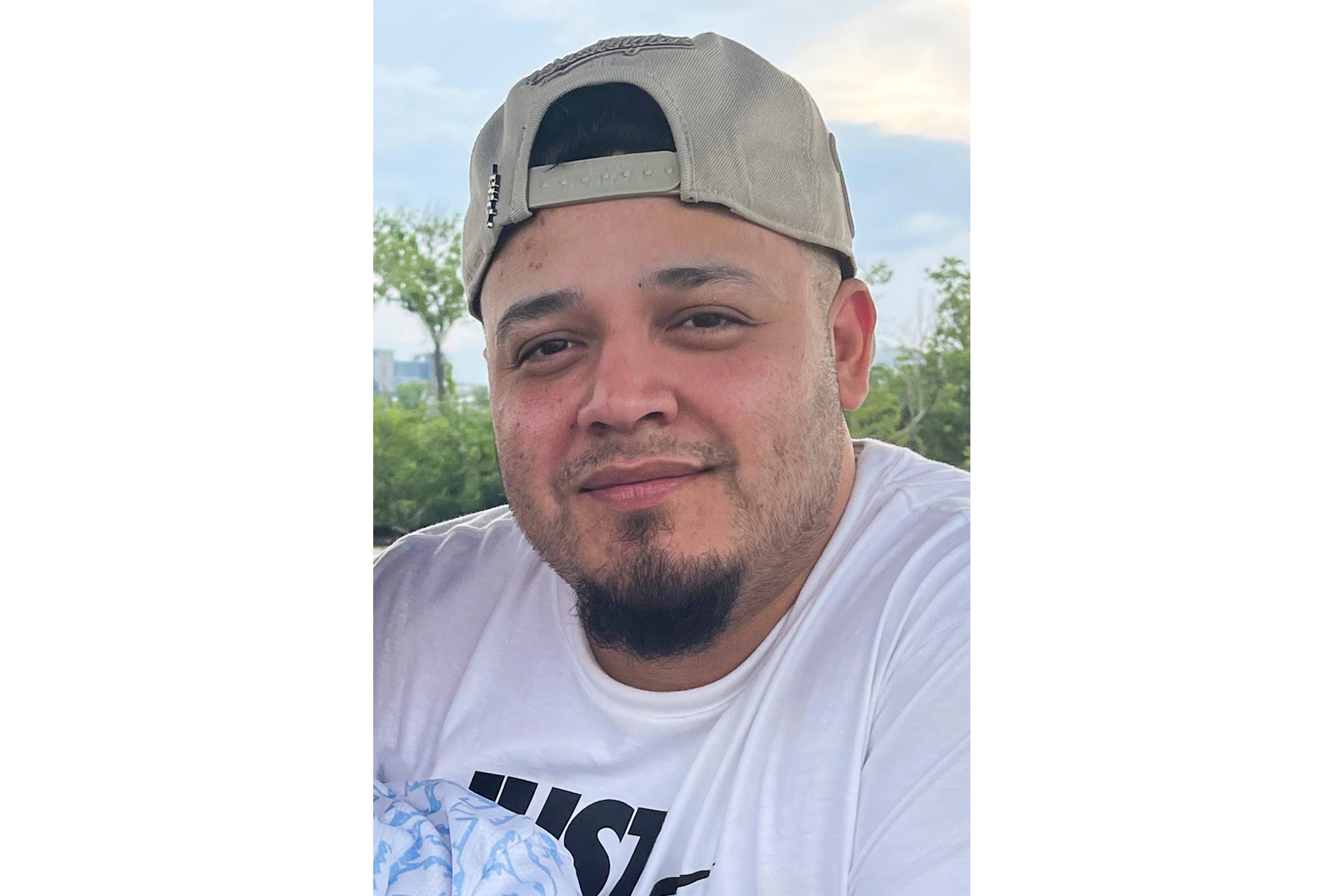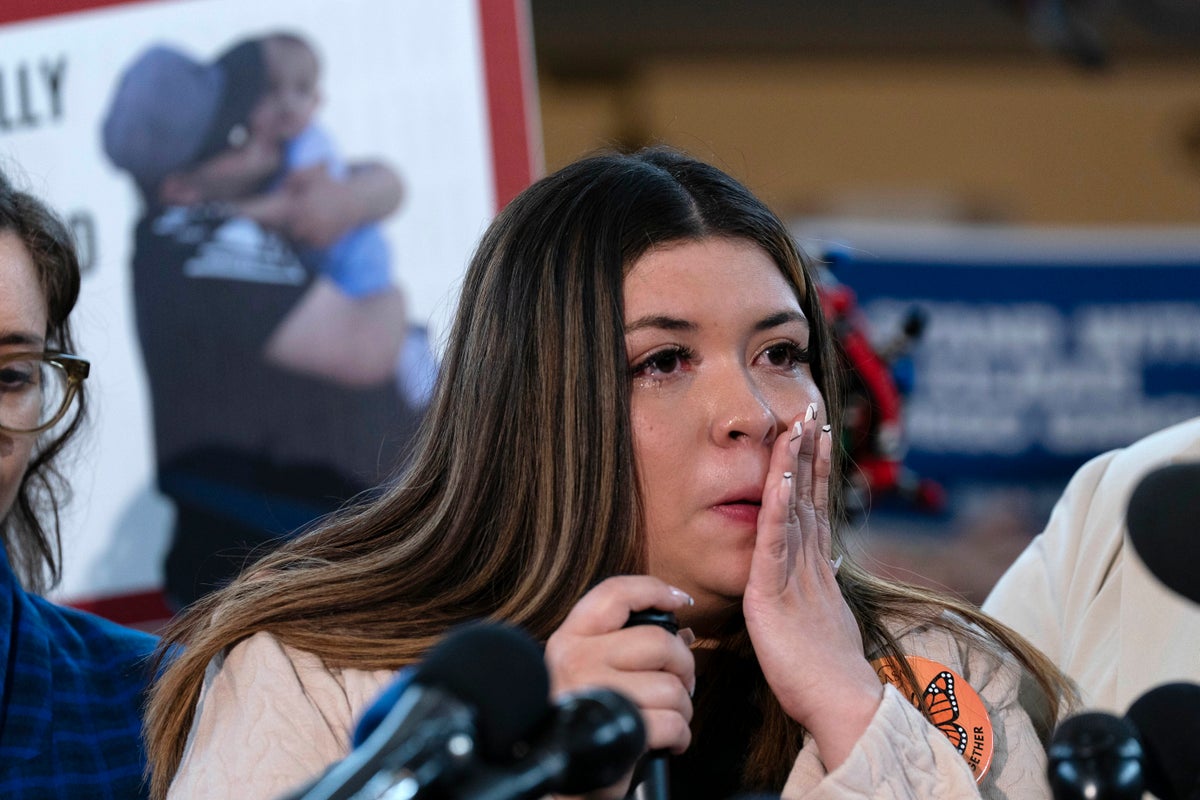On June 25, 2019, Kilmar Abrego Garcia and Jennifer Vasquez Sura married inside an immigration detention center while separated by a glass partition. An officer helped them exchange rings.
Vasquez Sura was nearing the end of a high-risk pregnancy while her soon-to-be husband faced the possibility of his removal from the United States to his native El Salvador. They thought the ceremony “might be our only chance to get married, even though it was far from how we ever imagined it,” she wrote in court documents. “It was heartbreaking not to be able to hug him.”
Months later, after Vasquez Sura gave birth to their son, a judge ultimately granted Abrego Garcia humanitarian protections to live and work legally in the U.S. with an order that prevented the government from deporting him to a country he fled as a teenager.
He eventually found work as a sheet metal worker, and enrolled in a five-year licensing program with the University of Maryland as he helped raise their son, who was diagnosed with autism, and two children from a previous relationship.
But, on March 15, 2025, despite the court order that blocks his removal from the country, federal agents put Abrego Garcia on a plane bound for El Salvador’s notorious prison, facing the prospect of indefinite detention.
Donald Trump’s administration admitted it made an “administrative error.” But officials are refusing to try to get him back, have raised unsubstantiated claims about his past, and argue the case is no longer in their hands — setting up what legal experts fear is a dangerous precedent-setting case for executive power and whether U.S. citizens could similarly be imprisoned abroad.
How Kilmar Abrego Garcia ended up in ICE custody
A local gang in El Salvador called Barrio 18 was extorting Abrego Garcia’s father’s pupusa business, culminating in threats and violence against his family members, according to court documents.
In 2011, when he was 16 years old, Abrego Garcia fled for the United States and made his way across the U.S.-Mexico border to Maryland, where his brother, a U.S. citizen, was living.
There, he met Sura, who is also a citizen.
On March 27, 2019, Abrego Garcia and Vasquez Sura went to their appointment with a perinatal specialist. They were excited to learn she was having a boy, she wrote in court filings.
The next morning, after dropping off their other two children at school and Sura at work, Abrego Garcia looked for work outside a Home Depot, where he could pick up construction work.
He didn’t return Sura’s messages later that day.

Abrego Garcia was taken into custody by officers from the Prince George’s County Police Department, and then Immigration and Customs Enforcement agents. Sura didn’t know where he was until the next morning, when he called her while he was in ICE custody, she said.
For the next six months, Abrego Garcia’s case moved through immigration court as the government sought his removal, claiming he was a member of transnational street gang MS-13 — a charge Abrego Garcia and his wife have vehemently denied.
The evidence against him boiled down to an accusation from a confidential informant, and that Abrego Garcia was wearing Chicago Bulls gear when he was arrested — which federal law enforcement agents allege is linked to gang membership. He has never been charged with or convicted of being a member of any gang.
Though Abrego Garcia had entered the country without legal permission as a teen, a federal judge ultimately agreed that sending him back to El Salvador would endanger his life. He barred the government from deporting him, on the condition that he regularly check in with ICE as he defends his claim to asylum to stay in the United States.
“Kilmar continued to be the supportive, loving, reliable, and law-abiding man I know and love. He was never arrested or accused of a crime,” Sura wrote. “We really believed that the false accusations had been cleared up and that they were behind us.”
They weren’t.
‘I never heard from Kilmar again’
On March 12, after picking up his son, now 5 years old, Abrego Garcia was pulled over. He called his wife, who spoke on the phone with an officer because he was not comfortable speaking English. After Abrego Garcia told the officer his son was in the backseat, the officer took his phone and hung up, according to Sura.
“A few minutes later, someone identifying themselves as with the Department of Homeland Security called me back and said that I needed to get there in 10 minutes to pick up my son or they would call child protective services,” she wrote.
Abrego Garcia later called her from a detention facility in Baltimore, then again in Louisiana, and again in Texas.
On March 15, he called one last time.
“That call was short and Kilmar’s tone was different,” she wrote. “He was scared. He was told he was being deported to El Salvador. He was told he was being deported to El Salvador to a super-max prison called ‘CECOT.’ He asked me to contact his mom with all his U.S. immigration paperwork so they can give that to a lawyer in El Salvador. After that, I never heard from Kilmar again.”
Trump administration defends ‘administrative error’
Last month, the Trump administration was hastily arranging for a series of charter flights to remove Venezuelan immigrants from the United States under the wartime Alien Enemies Act, which labeled alleged members of the Tren de Aragua gang “alien enemies” who can be summarily deported.
One of those planes allegedly carried immigrants with court orders for their removal, not under the president’s wartime authority. Abrego Garcia was on that plane — something administration officials have called an “oversight” — despite no orders for his removal from the country.
“On March 15, although ICE was aware of his protection from removal to El Salvador, Abrego Garcia was removed to El Salvador because of an administrative error,” government lawyers wrote in court filings.
But government lawyers have fought to keep him imprisoned. Following news of the government’s admission in court filings, Vice President JD Vance falsely labeled Abrego Garcia a “convicted gang member.” White House press secretary Karoline Leavitt admitted there was a “clerical error” in his case, but claimed, without providing evidence, that Garcia was a “leader” of the MS-13 gang, and “involved in human trafficking.”
Following in-court arguments on April 4, Maryland District Judge Paula Xinis ordered the administration to return Abrego Garcia to the United States.
Erez Reuveni, the acting deputy director of the Department of Justice immigration litigation division, told the judge he was “frustrated that I have no answers for you on a lot of these questions.”
In her 22-page ruling, Judge Xinis ripped the Trump administration for its “wholly lawless” decision and “grievous error” that “shocks the conscience.”
As “defendants acknowledge, they had no legal authority to arrest him, no justification to detain him, and no grounds to send him to El Salvador — let alone deliver him into one of the most dangerous prisons in the Western Hemisphere,” noted Judge Xinis.
“The ‘evidence’ against Abrego Garcia consisted of nothing more than his Chicago Bulls hat and hoodie,” she wrote, “and a vague, uncorroborated allegation from a confidential informant claiming he belonged to MS-13’s ‘Western’ clique in New York — a place he has never lived.”
After the hearing, the Justice Department suspended Reuveni for failing to “zealously advocate” on behalf of the government.
On April 7, appellate judges delivered a scorching opinion asserting that the government “has no legal authority to snatch a person who is lawfully present in the United States off the street and remove him from the country without due process.”
“The Government’s contention otherwise, and its argument that the federal courts are powerless to intervene, are unconscionable,” they wrote.
Ronald Reagan-appointed judge J. Harvie Wilkinson wrote: “There is no question that the government screwed up here.”
Kilmar “never should have been deported in the first place. I’m relieved the court has taken a step toward righting that wrong and protecting due process for all Americans,” according to Lucia Curiel, an immigration attorney who represented Abrego Garcia in his 2019 case.
Tricia McLaughlin — assistant secretary for public affairs at the Department of Homeland Security — has suggested that sharing what due process looks like for Abrego Garcia is “law-enforcement sensitive” and “would undermine national security.”
“If we did that every single time, that would simply be insane,” she told NPR.
Supreme Court intervenes
The Trump administration appealed to the Supreme Court, where solicitor general D. John Sauer repeated allegations that Abrego Garcia is a member of a “foreign terrorist organization” and claimed that the government’s error “does not license district courts to seize control over foreign relations” and “treat the Executive Branch as a subordinate diplomat.”
The “United States does not control the sovereign nation of El Salvador, nor can it compel El Salvador to follow a federal judge’s bidding,” he added.
In response, lawyers for Abrego Garcia said he “sits in a foreign prison solely at the behest of the United States, as the product of a Kafka-esque mistake.”
The “Executive branch may not seize individuals from the streets, deposit them in foreign prisons in violation of court orders, and then invoke the separation of powers to insulate its unlawful actions from judicial scrutiny,” they wrote.
Later that day, hours before a midnight deadline for the Trump administration to bring him back to Maryland, Chief Justice John Roberts agreed to pause the order from Judge Xinis, keeping Abrego Garcia in El Salvador, for now.
“This is just a temporary administrative stay; we have full confidence that the Supreme Court will resolve this matter as quickly as possible,” Abrego Garcia’s attorney Simon Sandoval-Moshenberg told The Independent.
The administration’s appeal to the Supreme Court is the latest legal battle following a flood of court orders against the executive branch, teeing up what legal experts fear are the president’s testing of the judiciary that could send the country plummeting into a constitutional crisis.
‘A shuddering degree of power’
Constitutional law scholars have warned that “there is no logical stopping point to the government’s dangerous argument.”
In arguments to a federal appeals court, the Trump administration is citing a unilateral authority under the executive branch that bars the courts from intervening in foreign affairs.
“If the government’s argument were correct, the Executive Branch would possess a shuddering degree of power — power that the President could wield in extreme and extraordinary ways, including against American citizens that the President simply disfavors,” according to court filings from constitutional law professors Erwin Chemerinsky, Marth Minow and Laurence Tribe.
“There is no logical stopping point to the government’s dangerous argument,” they added.
“There is no question — and could be no question — that the federal courts have jurisdiction over the U.S. officials who removed an individual from the United States and arranged for that individual to be held in a foreign prison, and who have continuing authority and power to correct their mistakes in such removal and rendition,” they wrote.
“All eyes are on the United States as the Trump administration continues to attack the constitution,” according to Ama S. Frimpong, legal director for immigrants’ advocacy group CASA.
“The courts have rightfully sided with Kilmar, against the Trump administration’s illegal overreach and constitutional violations,” she said. “We are looking forward to welcoming Kilmar home with open arms.”

